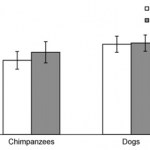communication
Non-human primate, that is.
Ape actor Peter Elliott shares his knowledge of chimpanzee and gorilla vocabulary and facial expressions.
via IMDb:
Peter Elliott is the film industry's primary primate. He both as a performer, in films like Missing Link and The Island of Doctor Moreau, and as a choreographer of other performers, as in Gorillas in the Mist and Congo. He also teaches animal study at London's Central School of Speech and Drama.
Dogs are pretty smart. They can have huge vocabularies, they can infer meaning in the growls of other dogs, and they can effortlessly figure out if other dogs want to play or fight with them. But their intelligence might be limited to the social domain; indeed, while they outperform chimpanzees in social tasks, chimpanzees outperform them in many other tasks. And they might have developed their impressive social skills as merely an accident of natural and artificial selection.
Previous research has shown that dogs can use lots of different forms of human communicative signals to find food,…
Predator-prey interactions are often viewed as evolutionary arms races; while predators improve their hunting behaviors and their ability to sneak up on their prey, the prey improve upon their abilities to detect and escape from their predators. The problem, of course, is that there is a trade-off between maintaining vigilance - the attention necessary to be consistently aware of others in the environment takes quite a bit of physical and mental energy - and doing all the other things that an animal must do, such as finding its own food. As a result of this trade-off, many social species,…
Different dog growls mean different things, right? Probably. But can you tell the difference?
Here's a dog growling when someone is trying to steal its food: link to mp3.
Here's a dog growling at a stranger: link to mp3.
You probably can't tell the difference. Neither could I. Dogs can. Surprised? Probably not. But, this is the first experimental evidence that dogs use different communicative vocalizations during social encounters with other dogs and with humans, depending on the situation.
The researchers recorded dog growls in three contexts: food guarding from another unfamiliar dog (…
Over in yesterday's communications skills post commenter Paul raises a question about priorities:
I wonder to what extent good writers, public speakers and communicators are being promoted in science in place of good thinkers - people who can challenge prevailing dogma, invent promising novel approaches to old problems, and who have the intuition needed for deducing correct theories from just a few observations.
I think of this as the "Weinstein Perelman Theory" because Eric Weinstein on Twitter has been pushing something similar with respect to Grisha Perelman turning down major math…
Today ScienceBlogs launched a new sponsored blog, Food Frontiers. The sponsor is PepsiCo. Here's the description of what the blog is going to be about from its inaugural post by Sb overlord Evan Lerner:
On behalf of the team here at ScienceBlogs, I'd like to welcome you to Food Frontiers, a new project presented by PepsiCo.
As part of this partnership, we'll hear from a wide range of experts on how the company is developing products rooted in rigorous, science-based nutrition standards to offer consumers more wholesome and enjoyable foods and beverages. The focus will be on innovations in…
I noticed a short item today at Inside Higher Education about Mike Adams, an associate professor of of criminal justice at the University of North Carolina at Wilmington , who is suing the university on the grounds that his promotion to full professor was denied due to his conservative Christian views. (Apparently, this legal action has been underway since 2007.)
I know very few details of the case, so I'm in no position to opine about whether Adams should or should not have been promoted. But there's one element of the case that seems to be legally interesting:
But part of the judge's…
As I am still getting lengthy comments at the Chris Mooney post accusing me of making unreasonable demands on scientists, I thought I should spell out as explicitly as possible what skills I think scientists ought to have. This probably won't solve the problem, but it'll give me something to point to the next time I get asked.
So, what communications skills should scientists have? The answer depends on what kind of science you're going to do, and what you want to do with it.
First and foremost, though: If you want to be a successful scientist, you need good communications skills. Full stop.…
The kerfuffle of the moment in the science blogosphere once again relates to Chris Mooney, who is pretty much a kerfuffle looking for a place to happen at this point. This time around it centers around a Washington Post op-ed that is basically the executive summary of a American Academy of Arts and Sciences paper that is itself the executive summary version of a series of four workshops on science and the public. You can get a reasonable sense of the kerfuffle from the links in Chris's responses to the responses.
I'm currently making one of my intermittent attempts to be a better person--…
tags: The Intriguing Sound of Marine Mammals, sounds, songs, communication, language acquisition, noise pollution, shipping, acoustic environment, vocal imprinting, marine mammals, dolphins, whales, Peter Tyack, TEDTalks, TED Talks, streaming video
Bird watchers (especially those who do most of their birding by ear) will particularly enjoy this video: Peter Tyack of Woods Hole talks about a hidden wonder of the sea: underwater sound. Onstage at Mission Blue, he explains the amazing ways whales use sound and song to communicate across hundreds of miles of ocean.
TEDTalks is a daily video…
Dogs are particularly good at tasks that involve communicating or cooperating with humans, which has led some researchers to speculate that they are really good at solving social tasks, more generally. For example, dogs can figure out where a human's attention is, are really good at picking up on eye-gaze and finger pointing cues, distinguish among different individual humans (by contrast, humans are really bad at distinguishing among different individual monkeys, for example), and at least in one outstanding case, are capable of "fast mapping."
Relative to non-human primates, domestic dogs…
Economic recovery has not yet made its presence felt at public universities in California. (Indeed, at least in the California State University system, all things budgetary are going to be significantly worse in the next academic year, not better.)
This means it's not a great time for purveyors of electronic journals to present academic libraries in public university systems with big increases in subscription prices. Yet Nature Publishing Group has, apparently, done just that by some 400%. And, as noted by Christina Pikas and Dorothea Salo and Jennifer Howard in The Chronicle of Higher…
Yesterday afternoon, I watched the livestream of the "All Creatures Great and Smart" session of the World Science Festival in New York City. The session was absolutely fantastic, and featured Brian Hare, Vanessa Woods, Jeremy Niven, Patrick Hof and Klaus Zuberbühler.
The conversation challenged long-held assumptions about the differences between "animal" and "human", and included fascinating discussion about pin-sized brains that can count, categorize, and hold a grudge against those who've tried to swat them. Does your dog really think and feel like a human? Do our closest primate…
...and what can word-learning in dogs teach us about the evolution of language in humans?
What is involved in the learning of a single new word? Consider the word "tiger", being learned by a child with already a modest vocabulary, at least for animal words. First the child must make a new entry in the mental lexicon - that "tiger" is a word in the first place. He has to categorize it as a noun. It has to be categorized under "animal" (a supernym) and related to its hyponyms, like "Sumatran tiger." Then, of course, the child has to learn what actual *thing* the word "tiger" refers to. Now,…
[It's a really busy week over here at blog headquarters, because it is data collection week. Data collection week is awesome, but it means less time for blogging. So here's a piece from the archives. I picked this one especially for Drugmonkey, because he liked it so much.]
The Harpy Eagle (Harpia harpyja) is a nasty scary-looking muppethugging monster of a carnivorous bird. Female harpies weigh 14-20 pounds, and males weigh 8.5-12 pounds. They stand between 2.9 and 3.5 feet tall. The wingspan of the harpy eagle can reach 6 feet, 7 inches. The talons - sharp claws to grasp onto its prey -…
tags: Wikileaks on the Culture Show, freedom of publishing, freedom of press, investigative journalism, communication, information technology, internet, television, Culture Show, Jacques Peretti, John Young, Julian Assange, streaming video
Jacques Peretti looks into Wikileaks, the anonymous whistle-blowing internet site. Features an interview with John Young of Cryptome and Julian Assange of Wikileaks. Just for good measure, John has published details of the email correspondence with the BBC.
What information is contained in the call of a mammal? Some calls might reflect the internal emotional state of the animal, like fear or anxiety, or they can refer to an external object, agent, or event, like the presence of a predator. Rhesus monkeys, lemurs, baboons, and guinea pigs, for example, will produce calls when separated from their conspecifics or in the presence of a stranger. Howler monkeys produce specific alarm calls for avian predators, even when they have never encountered an avian predator for several generations. Vervet monkeys produce different calls in response to…
I'll confess that I am not one who spends much time reading the reviews of books posted on the websites of online booksellers. By the time I'm within a click of those reviews, I pretty much know what I want. However, a lot of people find them helpful, and the ability to post your own review of a book (or a film, or a product, or a business) online seems to give consumers more of a voice rather than leaving it to "professional" reviewers or tastemakers.
Who, after all, knows whether those professional reviewers' first loyalties are to the public?
But, unsurprisingly, it turns out that…
That post about how hard it is to clean up the scientific literature has spawned an interesting conversation in the comments. Perhaps predictably, the big points of contention seem to be how big a problem a few fraudulent papers in the literature really are (given the self-correcting nature of science and all that), and whether there larger (and mistaken) conclusions people might be drawing about science on the basis of a small fraction of the literature.
I will note just in passing that we do not have reliable numbers on what percentage of the papers published in the scientific literature…
Science is supposed to be a project centered on building a body of reliable knowledge about the universe and how various pieces of it work. This means that the researchers contributing to this body of knowledge -- for example, by submitting manuscripts to peer reviewed scientific journals -- are supposed to be honest and accurate in what they report. They are not supposed to make up their data, or adjust it to fit the conclusion they were hoping the data would support. Without this commitment, science turns into creative writing with more graphs and less character development.
Because the…






